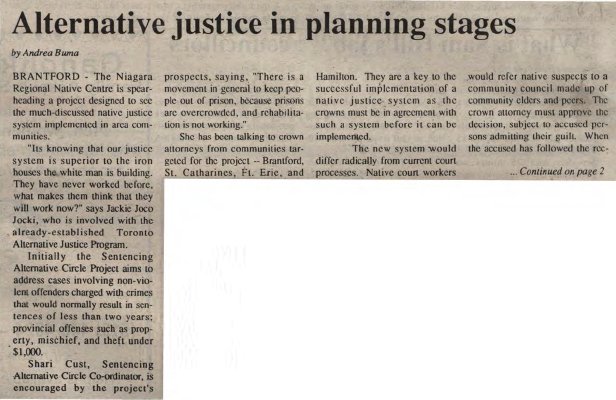"Alternative justice in planning stages"
- Publication
- Tekawennake News (Ohsweken, Ontario), 15 Jul 1998, pp.1-2
- Full Text
- Alternative justice in planning stagesby Andrea Buma
BRANTFORD - The Niagara Regional Native Centre is spearheading a project designed to see the much-discussed native justice system implemented in area communities.
"Its knowing that our justice system is superior to the iron houses the white man is building. They have never worked before, what makes them think that they will work now?" says Jackie Joco Jocki, who is involved with the already-established Toronto Alternative Justice Program.
Initially the Sentencing Alternative Circle Project aims to address cases involving non-violent offenders charged with crimes that would normally result in sentences of less than two years; provincial offenses such as property, mischief, and theft under $1,000.
Shari Cust, Sentencing Alternative Circle Co-ordinator, is encouraged by the project's prospects, saying, "There is a movement in general to keep people out of prison, because prisons are overcrowded, and rehabilitation is not working."
She has been talking to crown attorneys from communities targeted for the project - Brantford, St. Catharines Ft. Erie, and Hamilton. They are a key to the successful implementation of a native justice system as the crowns must be in agreement with such a system before it can be implemented.
The new system would differ radically from current court processes. Native court workers would refer native suspects to a community council made up of community elders and peers. The crown attorney must approve the decision, subject to accused persons admitting their guilt. When the accused has followed the rec-
(Continued on page 2)
Alternative justice in planning stages(Continued from front page)
ommendations given by the community council, charges are usually dropped.Pine Tree Native Centre's Cecil Sault has been a Native criminal court worker since 1994, and is behind the idea of the alternative justice program. But he cautions that there is a lot of work to be done, saying the project is just in the brainstorming stage right now.
He says a lot of community input is needed before a model is designed and submitted to Ontario Attorney-General Charles Hamick.
And he worries that program co-ordinator Shari Cust is finished her work term in August. "When she is done, is that the end of it? Does it then just lay dormant."
Sault believes that the project is important enough to warrant widespread involvement by the community.
"If it gets into operation it would be successful. It will be native people working with native people, and the success rate would be higher."
The community council hearing involves 3-5 community members, elders, family members, and the victim (if they desire to participate).
Cust says that the program is needed to address the huge problems associated with the current justice system, such as inherent racism and a lack of Native directed programming. She says the differences between "native and Western Canadians are not being recognized," and believes that this has resulted in the over-representation of native people in the criminal justice system.
Cust recently completed a thesis on the subject of sentencing circle programs in order to earn her B.A. in Sociology at Brock University, and it is a topic that has captured her interest.
She is currently visiting the targeted communities and holding seminars to gather input from community members. A session held at Pine Tree Native Centre in Brantford on Wednesday night saw a small but vocal and highly interested group gathered to give their input.
Many expressed the opinion that the program was "long overdue."
One woman described herself as "white, but I have realized that I am hearing history from only the white man's perspective, and I am tired of it. I am here to hear your ideas."
Joco Jocki was eloquent in her arguments as to the superiority of the native idea of justice, and the importance of the alternative justice program. "For me one of the most important things is taking our traditions and putting them into 1998. Because they still belong there, they operate there. It's a group of people who believe in themselves and each other."
"It's our own visions, and keeping hold of that belief, learning to respect that above all others," she said.
- Creator
- Buma, Andrea, Author
- Media Type
- Text
- Newspaper
- Item Type
- Clippings
- Publisher
- Tekawennake News
- Place of Publication
- Six Nations of the Grand River, ON
- Date of Publication
- 15 Jul 1998
- Subject(s)
- Personal Name(s)
- Jocki, Jackie Joco ; Cust, Shari ; Sault, Cecil.
- Corporate Name(s)
- Niagara Regional Native Centre ; Toronto Alternative Justice Program ; Pine Tree Native Centre ; Brock University.
- Local identifier
- SNPL005051v00d
- Language of Item
- English
- Geographic Coverage
-
-
Ontario, Canada
Latitude: 43.1668 Longitude: -80.29967
-
- Creative Commons licence
 [more details]
[more details]- Copyright Statement
- Public domain: Copyright has expired according to Canadian law. No restrictions on use.
- Copyright Date
- 1998
- Copyright Holder
- Tekawennake News
- Contact
- Six Nations Public LibraryEmail:info@snpl.ca
Website:
Agency street/mail address:1679 Chiefswood Rd
PO Box 149
Ohsweken, ON N0A 1M0
519-445-2954



